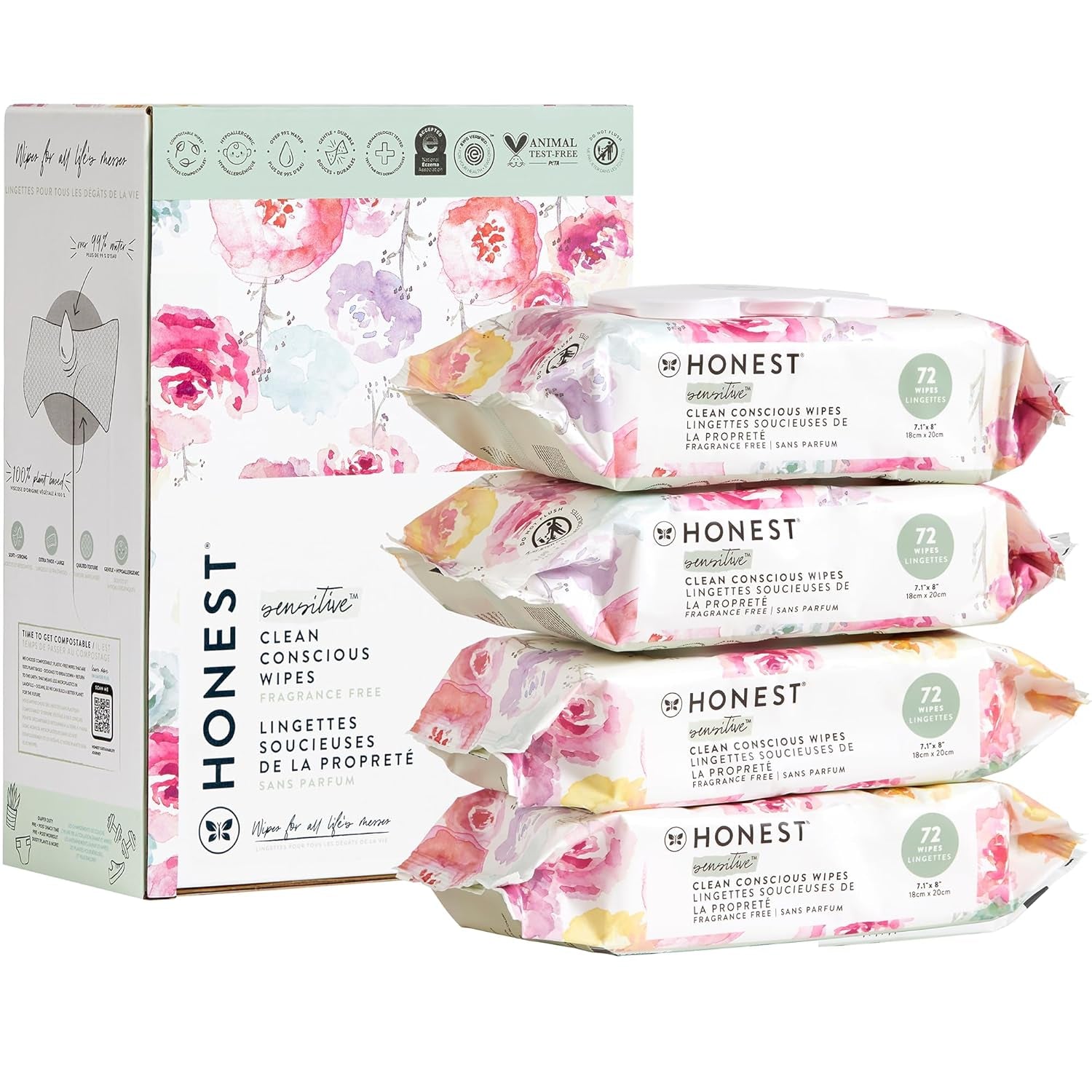
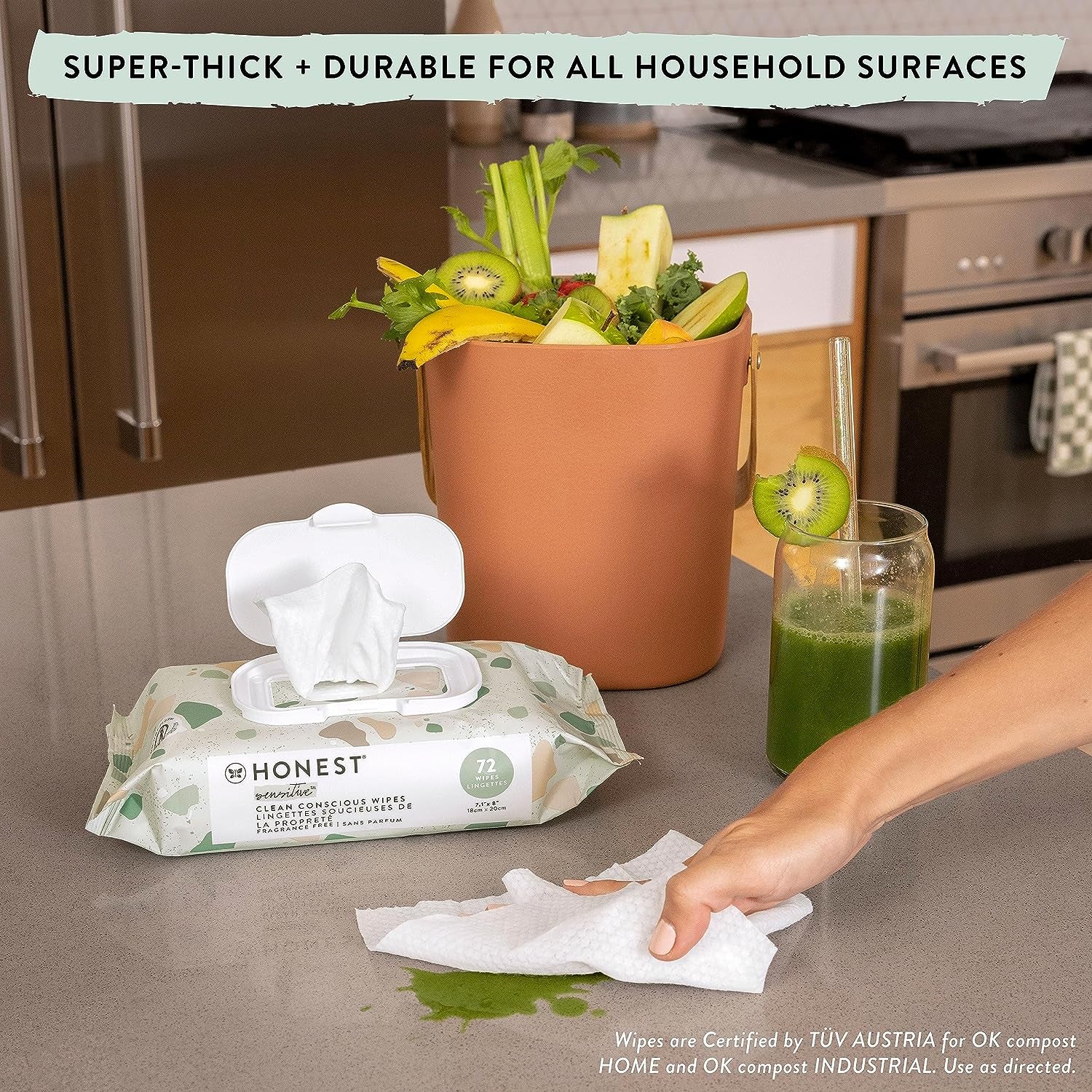
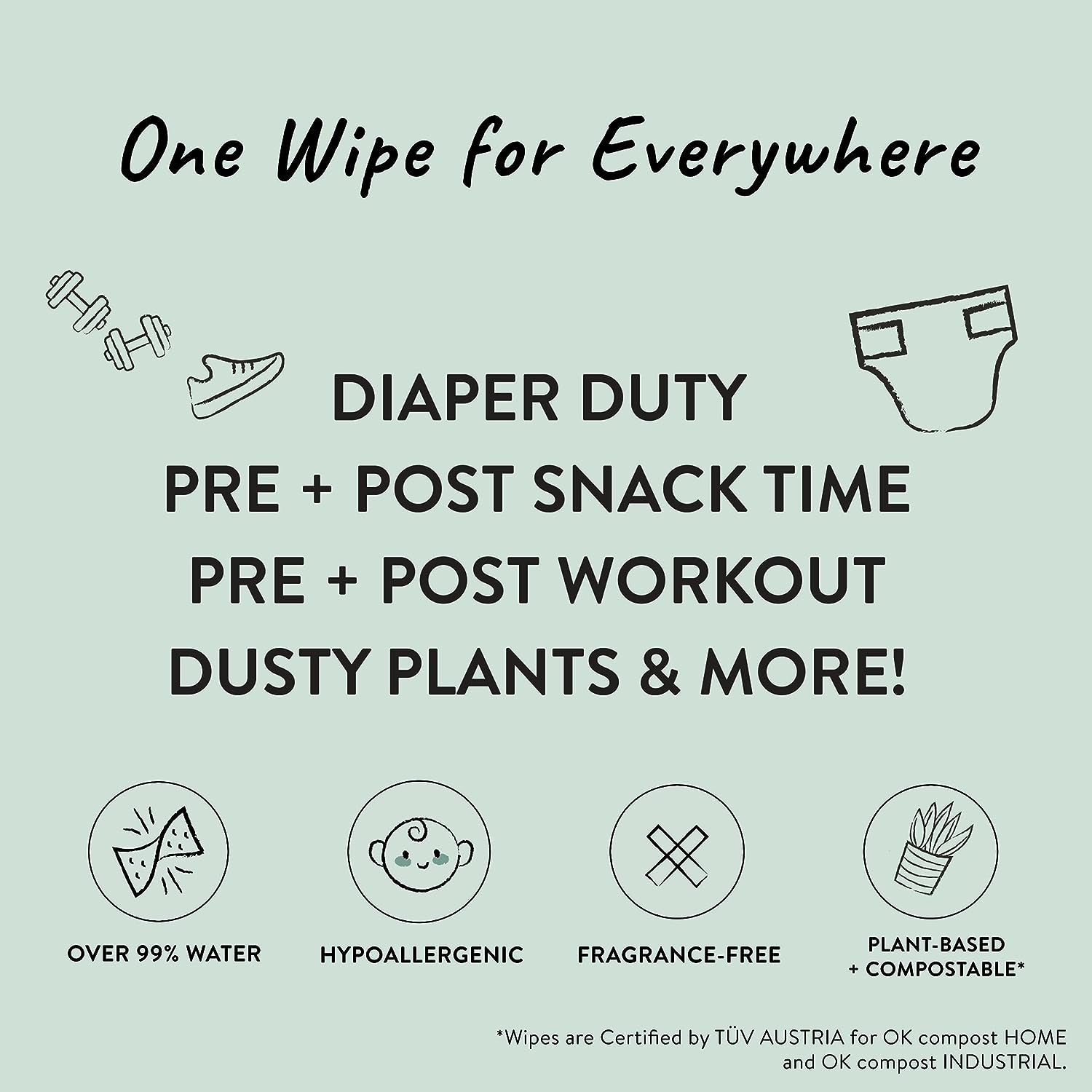
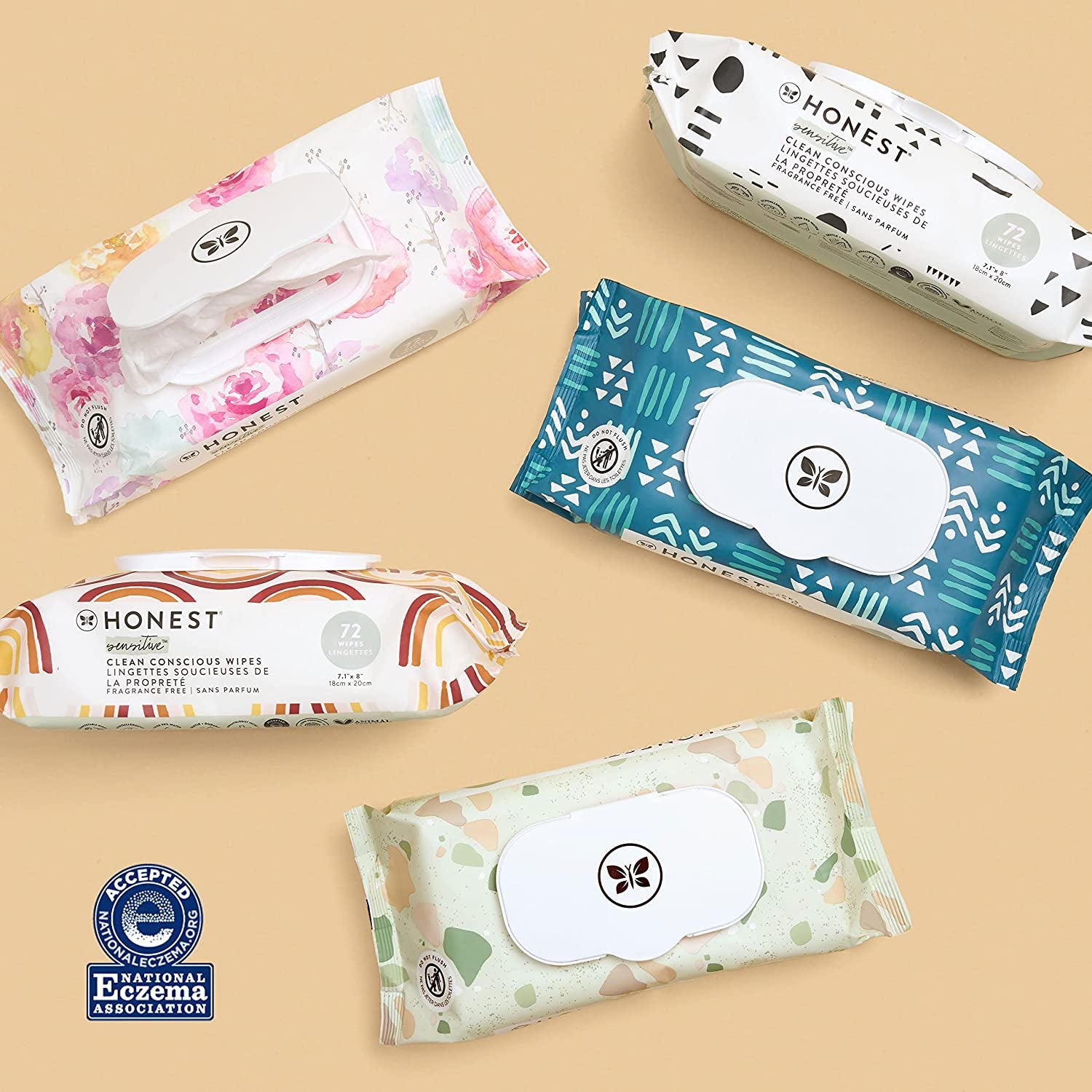
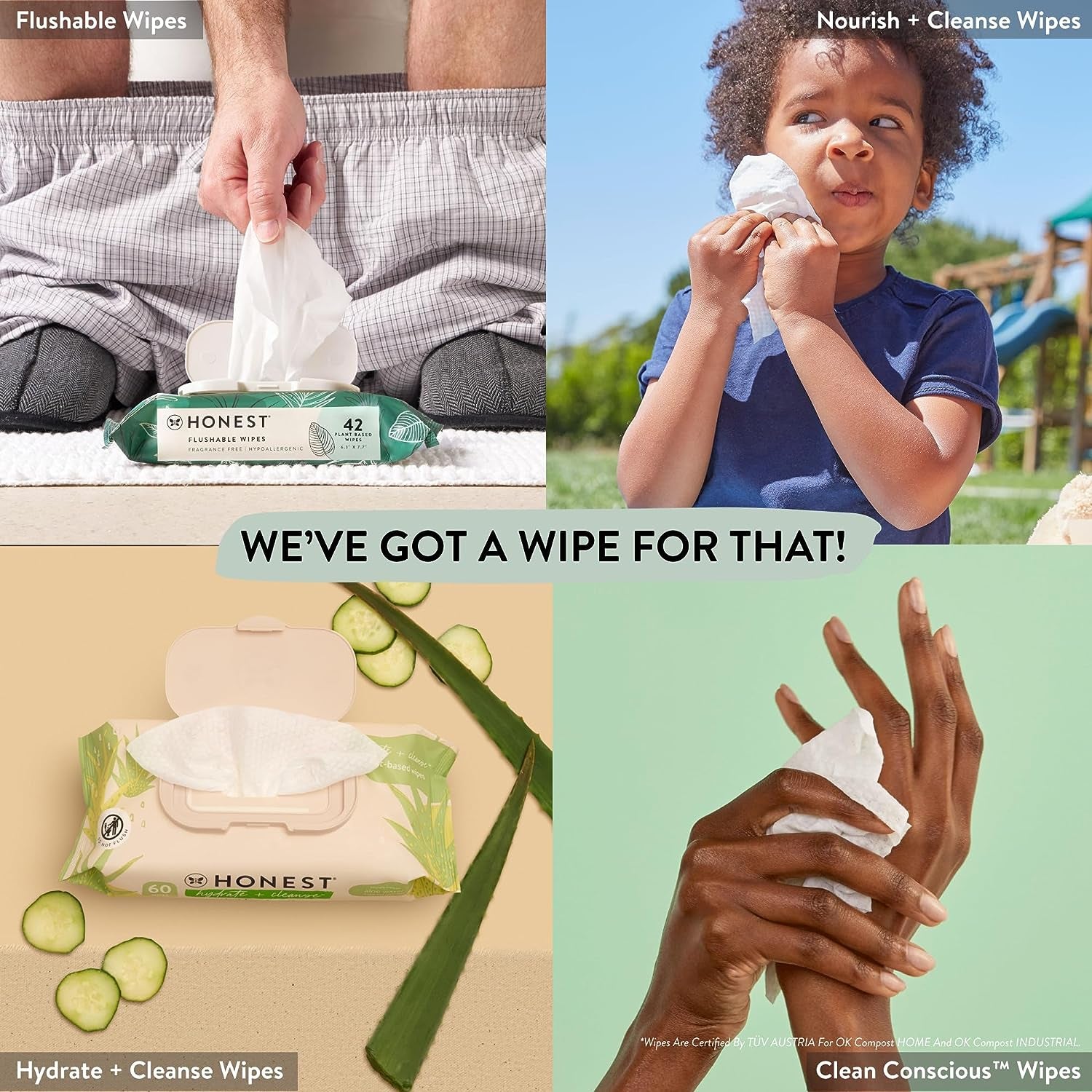
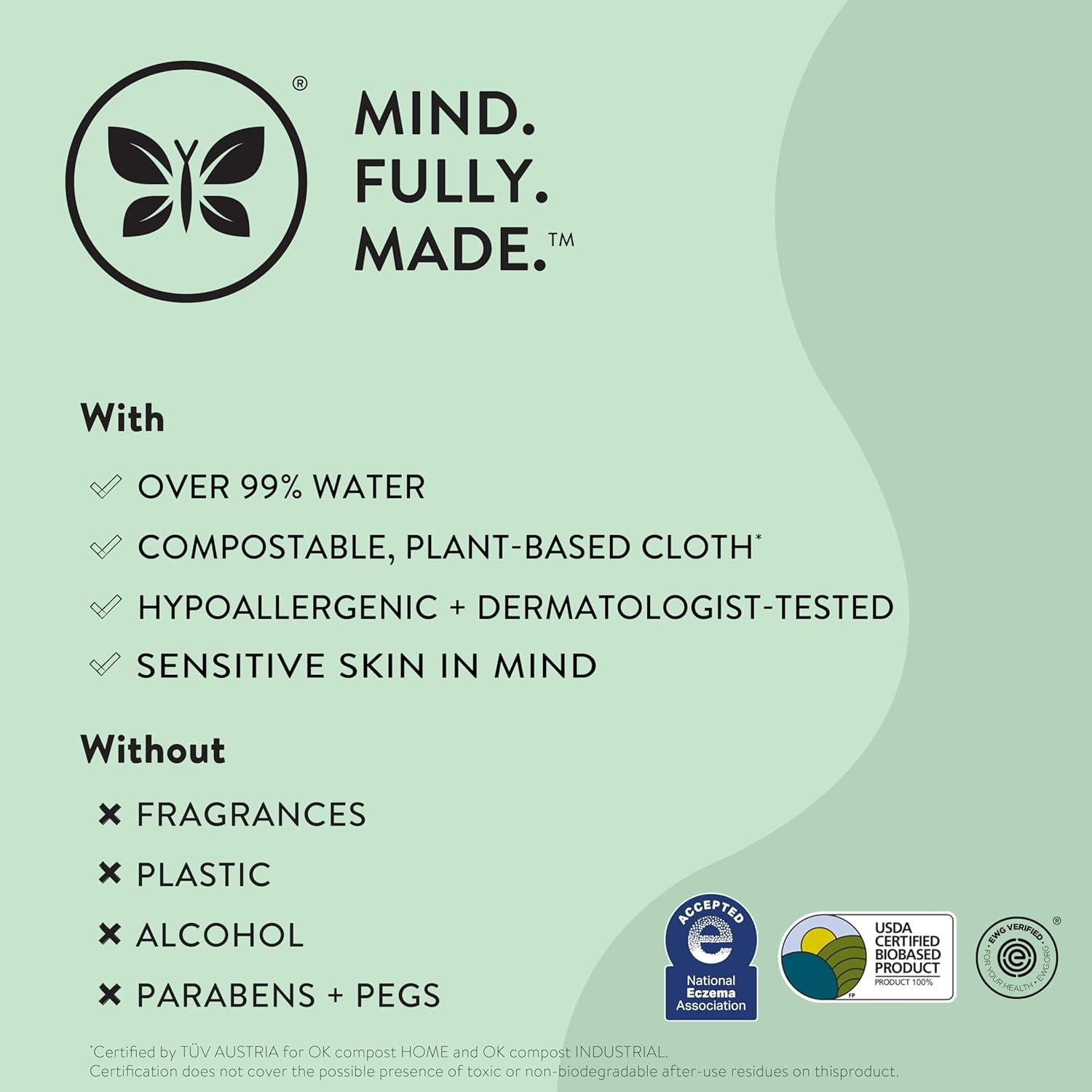
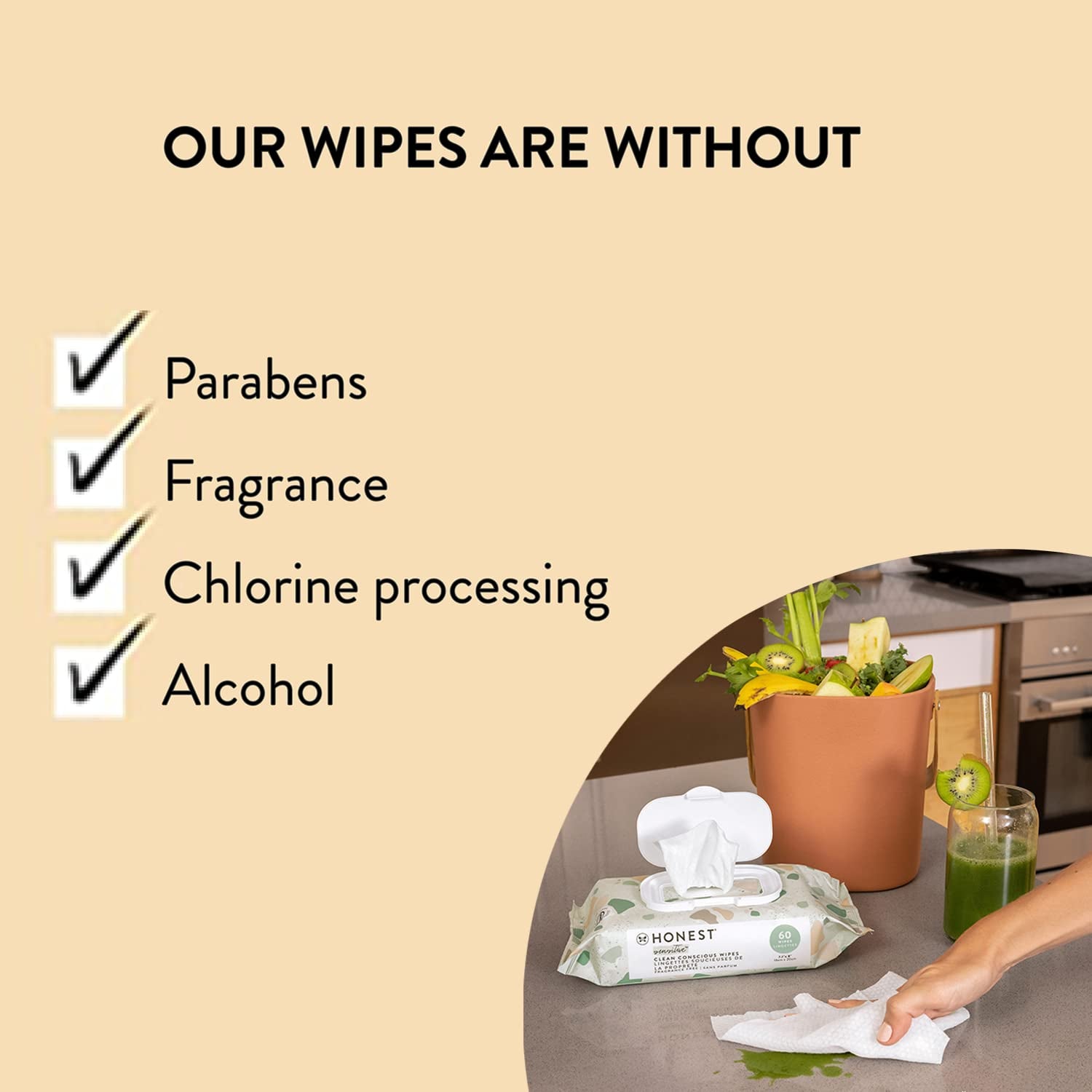
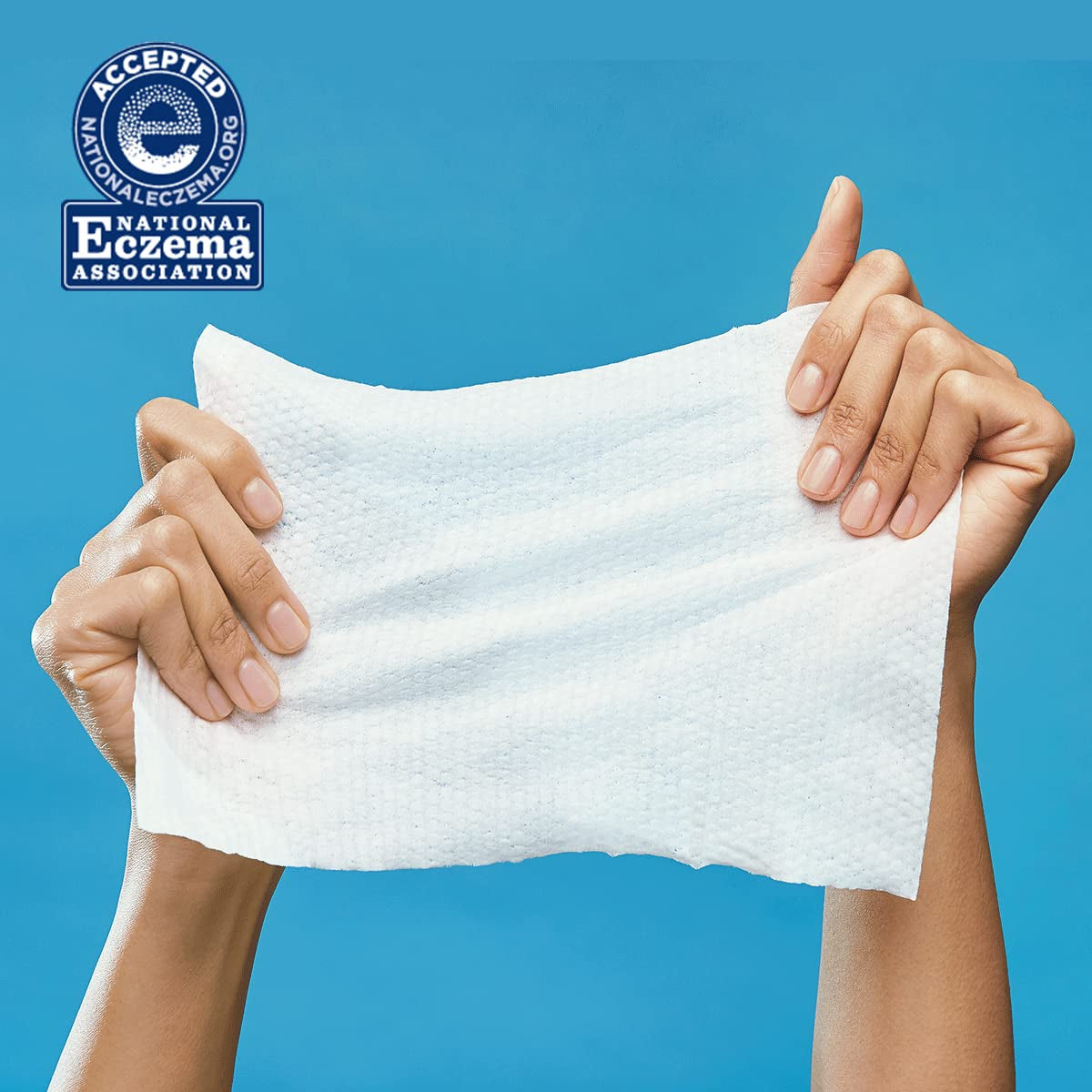
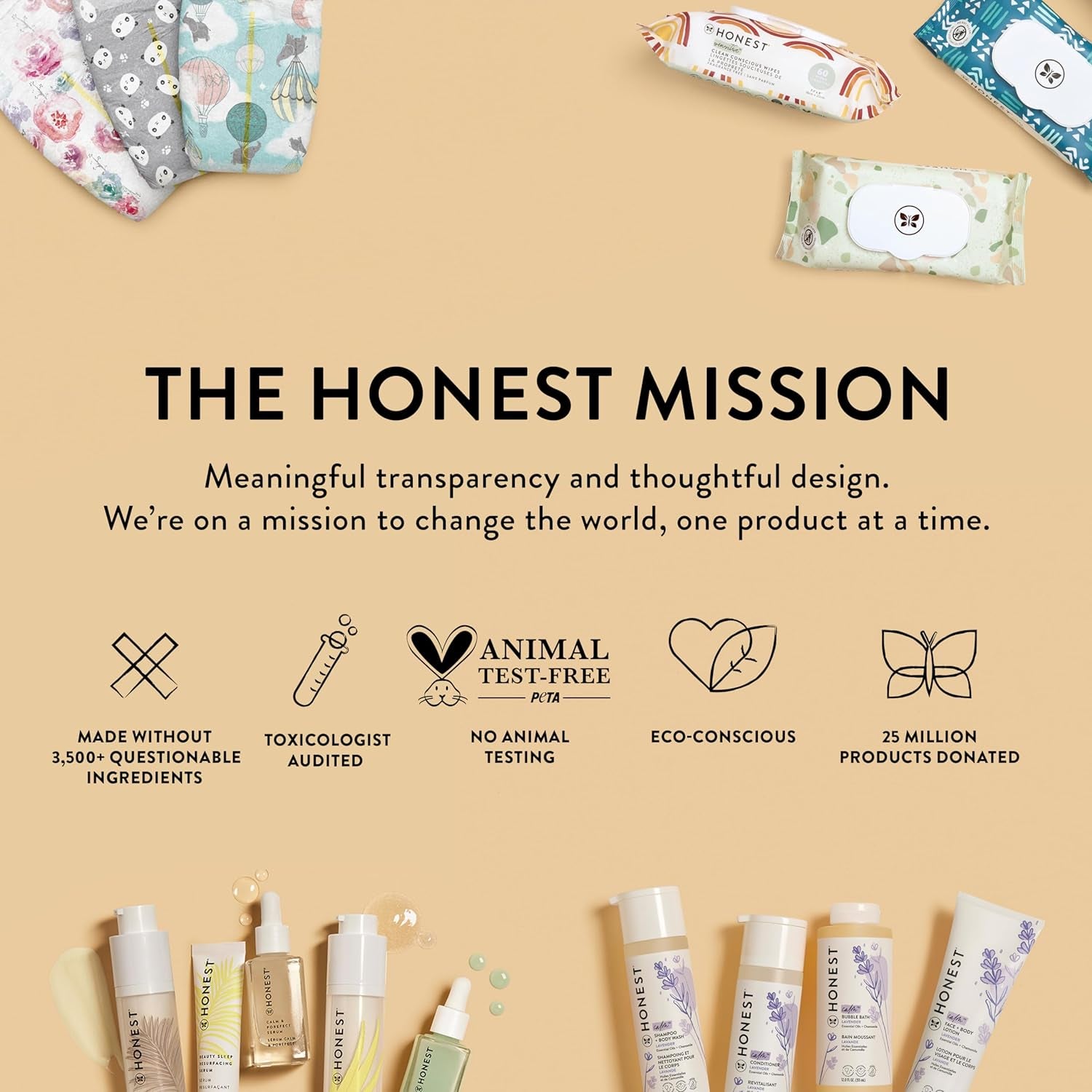
The Honest Company Wet Wipes - Hypoallergenic, Compostable, EWG Verified - 288 Count


Citric Acid
Medium RiskCitric acid is an alpha hydroxy acid used in personal care products primarily for its role as a pH adjuster and natural preservative. It occurs naturally in citrus fruits and is commonly utilized in various formulations for its chelating properties and mild exfoliation benefits.
Sustai Insights
Citric acid offers functional benefits as an effective preservative and pH stabilizer, contributing to product longevity and stability. It is biodegradable and derived from renewable sources. Health risks are low, with minimal concerns regarding carcinogenicity, allergies, and reproductive toxicity. However, moderate use restrictions exist due to potential irritation at high concentrations. Environmental risks are limited, as citric acid is not known to accumulate in ecosystems. Regulatory agencies have no significant advisories against its use. Overall, it is assessed as a medium-risk ingredient, with safe usage practices recommended and alternatives available.
Sodium Benzoate
Medium RiskSodium benzoate is a preservative commonly used in food and cosmetic products to prevent microbial growth and extend shelf life. It is derived from benzoic acid and is effective at low concentrations, often used in acidic environments like beverages and condiments.
Sustai Insights
Sodium benzoate serves effectively as a preservative, contributing to product stability and safety. It is generally recognized as safe with low concerns for carcinogenicity, allergies, and reproductive toxicity, though it faces moderate use restrictions in some regions. Environmental risks include its potential as a pollutant, but it does not bioaccumulate significantly. Regulatory bodies have issued advisories regarding its concentration in products. Overall, the risk level is assessed as medium, with safe usage practices recommended. Alternatives such as potassium sorbate may provide similar benefits with potentially lower restrictions.
Caprylyl Glycol
Low RiskCaprylyl glycol (1,2-octanediol) is a multifunctional cosmetic ingredient primarily used as a skin-conditioning agent and preservative. It is derived from caprylic acid, a fatty acid found in coconut oil, and is commonly included in personal care products for its moisturizing properties.
Sustai Insights
Caprylyl glycol offers functional benefits such as acting as an effective humectant and preservative, enhancing skin hydration and product stability. It is considered to have low health risks, with no significant concerns regarding carcinogenicity, allergies, or reproductive toxicity. Environmentally, it poses minimal risks, being non-bioaccumulative and not linked to pollution. Regulatory assessments affirm its safety, with no major advisories against its use. Overall, the ingredient is assessed to have a low risk, making it a suitable choice in cosmetic formulations.
Water
Low RiskWater is a clear, colorless liquid essential for various biological processes. It serves as a solvent in formulations, facilitating the dissolution of other ingredients and enhancing product texture and application. Additionally, water plays a crucial role in hydration and is a key component in many cosmetic and personal care products.
Sustai Insights
Water is an effective solvent and hydrator, contributing to the texture and efficacy of formulations. It is biodegradable and generally regarded as safe, with low concerns regarding carcinogenicity, allergies, and reproductive toxicity. However, excessive water usage can lead to environmental concerns, particularly regarding resource depletion. Regulatory bodies do not impose restrictions on water use in cosmetics. Overall, the risks associated with water are low, making it a safe and essential ingredient.
Trisodium Ethylenediamine Disuccinate
Low RiskTrisodium ethylenediamine disuccinate is a chelating agent commonly used in various formulations to enhance product stability and effectiveness. It functions by binding metal ions, which can otherwise catalyze degradation reactions, thereby improving the longevity and performance of personal care and cleaning products.
Sustai Insights
Trisodium ethylenediamine disuccinate offers functional benefits as an effective chelating agent that helps stabilize formulations. Its health risks are low, with minimal concerns surrounding carcinogenicity, allergies, or reproductive toxicity. Environmentally, it poses low risk, not contributing significantly to pollution or bioaccumulation. Currently, it is not restricted by regulatory bodies. Overall, the ingredient is assessed as low risk, making it a safe choice for various applications.
Ethylhexylglycerin
Low RiskEthylhexylglycerin is a glyceryl ether utilized primarily as a skin-conditioning agent and preservative in cosmetic formulations. It enhances the efficacy of preservatives and serves as a humectant, helping to retain moisture in the skin. This ingredient is commonly found in various personal care products.
Sustai Insights
Ethylhexylglycerin offers functional benefits as an effective preservative and skin-conditioning agent, contributing to product longevity and moisture retention. Health risks are generally low, with minor concerns regarding allergic contact dermatitis and irritant potential. Environmentally, it poses minimal risks, not being recognized as a pollutant or bioaccumulative. Regulatory bodies have imposed few restrictions, indicating its safety for use. Overall, its risk level is assessed as low, making it a viable option in cosmetic formulations. For those seeking alternatives, ingredients like propanediol may serve similar functions with potentially lower irritation profiles.
Sorbitan Oleate Decylglucoside Crosspolymer
Low RiskSorbitan oleate decylglucoside crosspolymer is a synthetic polymer derived from sorbitan oleate and decylglucoside. It functions primarily as an emulsifier and thickening agent in cosmetic and personal care products, aiding in the stabilization of formulations and improving texture.
Sustai Insights
Sorbitan oleate decylglucoside crosspolymer offers functional benefits as an effective emulsifier and stabilizer, enhancing product consistency. It has low health risk concerns related to carcinogenicity, allergenic potential, and reproductive toxicity. Environmentally, it presents low bioaccumulation and pollution risks. Regulatory bodies do not impose restrictions on its use. Overall, its risk level is assessed as low, making it a suitable ingredient in formulations.
Sustai Verified ensures products meet the highest standards for health, sustainability, and transparency. Each product undergoes thorough evaluation by experts who verify sustainability claims, health impacts, and ingredient integrity. Look for the Sustai Verified badge as a mark of trust and alignment with your values. Learn more on our How It Works page.
See How It Works
Sustai Verified ensures products meet the highest standards for health, sustainability, and transparency. Each product undergoes thorough evaluation by experts who verify sustainability claims, health impacts, and ingredient integrity. Look for the Sustai Verified badge as a mark of trust and alignment with your values. Learn more on our How It Works page.
See How It Works
Sustai Verified ensures products meet the highest standards for health, sustainability, and transparency. Each product undergoes thorough evaluation by experts who verify sustainability claims, health impacts, and ingredient integrity. Look for the Sustai Verified badge as a mark of trust and alignment with your values. Learn more on our How It Works page.
See How It Works
Citric Acid
Medium RiskCitric acid is an alpha hydroxy acid used in personal care products primarily for its role as a pH adjuster and natural preservative. It occurs naturally in citrus fruits and is commonly utilized in various formulations for its chelating properties and mild exfoliation benefits.
Sustai Insights
Citric acid offers functional benefits as an effective preservative and pH stabilizer, contributing to product longevity and stability. It is biodegradable and derived from renewable sources. Health risks are low, with minimal concerns regarding carcinogenicity, allergies, and reproductive toxicity. However, moderate use restrictions exist due to potential irritation at high concentrations. Environmental risks are limited, as citric acid is not known to accumulate in ecosystems. Regulatory agencies have no significant advisories against its use. Overall, it is assessed as a medium-risk ingredient, with safe usage practices recommended and alternatives available.
Caprylyl Glycol
Low RiskCaprylyl glycol (1,2-octanediol) is a multifunctional cosmetic ingredient primarily used as a skin-conditioning agent and preservative. It is derived from caprylic acid, a fatty acid found in coconut oil, and is commonly included in personal care products for its moisturizing properties.
Sustai Insights
Caprylyl glycol offers functional benefits such as acting as an effective humectant and preservative, enhancing skin hydration and product stability. It is considered to have low health risks, with no significant concerns regarding carcinogenicity, allergies, or reproductive toxicity. Environmentally, it poses minimal risks, being non-bioaccumulative and not linked to pollution. Regulatory assessments affirm its safety, with no major advisories against its use. Overall, the ingredient is assessed to have a low risk, making it a suitable choice in cosmetic formulations.
Water
Low RiskWater is a clear, colorless liquid essential for various biological processes. It serves as a solvent in formulations, facilitating the dissolution of other ingredients and enhancing product texture and application. Additionally, water plays a crucial role in hydration and is a key component in many cosmetic and personal care products.
Sustai Insights
Water is an effective solvent and hydrator, contributing to the texture and efficacy of formulations. It is biodegradable and generally regarded as safe, with low concerns regarding carcinogenicity, allergies, and reproductive toxicity. However, excessive water usage can lead to environmental concerns, particularly regarding resource depletion. Regulatory bodies do not impose restrictions on water use in cosmetics. Overall, the risks associated with water are low, making it a safe and essential ingredient.
Sodium Benzoate
Medium RiskSodium benzoate is a preservative commonly used in food and cosmetic products to prevent microbial growth and extend shelf life. It is derived from benzoic acid and is effective at low concentrations, often used in acidic environments like beverages and condiments.
Sustai Insights
Sodium benzoate serves effectively as a preservative, contributing to product stability and safety. It is generally recognized as safe with low concerns for carcinogenicity, allergies, and reproductive toxicity, though it faces moderate use restrictions in some regions. Environmental risks include its potential as a pollutant, but it does not bioaccumulate significantly. Regulatory bodies have issued advisories regarding its concentration in products. Overall, the risk level is assessed as medium, with safe usage practices recommended. Alternatives such as potassium sorbate may provide similar benefits with potentially lower restrictions.
Trisodium Ethylenediamine Disuccinate
Low RiskTrisodium ethylenediamine disuccinate is a chelating agent commonly used in various formulations to enhance product stability and effectiveness. It functions by binding metal ions, which can otherwise catalyze degradation reactions, thereby improving the longevity and performance of personal care and cleaning products.
Sustai Insights
Trisodium ethylenediamine disuccinate offers functional benefits as an effective chelating agent that helps stabilize formulations. Its health risks are low, with minimal concerns surrounding carcinogenicity, allergies, or reproductive toxicity. Environmentally, it poses low risk, not contributing significantly to pollution or bioaccumulation. Currently, it is not restricted by regulatory bodies. Overall, the ingredient is assessed as low risk, making it a safe choice for various applications.
Ethylhexylglycerin
Low RiskEthylhexylglycerin is a glyceryl ether utilized primarily as a skin-conditioning agent and preservative in cosmetic formulations. It enhances the efficacy of preservatives and serves as a humectant, helping to retain moisture in the skin. This ingredient is commonly found in various personal care products.
Sustai Insights
Ethylhexylglycerin offers functional benefits as an effective preservative and skin-conditioning agent, contributing to product longevity and moisture retention. Health risks are generally low, with minor concerns regarding allergic contact dermatitis and irritant potential. Environmentally, it poses minimal risks, not being recognized as a pollutant or bioaccumulative. Regulatory bodies have imposed few restrictions, indicating its safety for use. Overall, its risk level is assessed as low, making it a viable option in cosmetic formulations. For those seeking alternatives, ingredients like propanediol may serve similar functions with potentially lower irritation profiles.
Sorbitan Oleate Decylglucoside Crosspolymer
Low RiskSorbitan oleate decylglucoside crosspolymer is a synthetic polymer derived from sorbitan oleate and decylglucoside. It functions primarily as an emulsifier and thickening agent in cosmetic and personal care products, aiding in the stabilization of formulations and improving texture.
Sustai Insights
Sorbitan oleate decylglucoside crosspolymer offers functional benefits as an effective emulsifier and stabilizer, enhancing product consistency. It has low health risk concerns related to carcinogenicity, allergenic potential, and reproductive toxicity. Environmentally, it presents low bioaccumulation and pollution risks. Regulatory bodies do not impose restrictions on its use. Overall, its risk level is assessed as low, making it a suitable ingredient in formulations.
Discover the ultimate solution for life’s messes with The Honest Company Clean Conscious Unscented Wipes. Made with over 99% water and only seven transparent ingredients, these hypoallergenic wipes are perfect for sensitive skin and suitable for the whole family.
- Gentle for Sensitive Skin: Hypoallergenic and dermatologist tested, these wipes are recognized by the National Eczema Association, ensuring safe use for all skin types.
- Multi-Purpose Convenience: Ultra-durable and extra thick, these wipes are ideal for diaper changes, post-workout refreshes, cleaning pet paws, and tackling sticky fingers.
- Eco-Friendly Choice: Compostable and made from plant-based materials, they break down in just eight weeks, contributing to a healthier planet.
- Simple Ingredients: With no plastic, fragrances, or harsh chemicals, you can trust each wipe to be safe and effective.
- Easy Dispensing: The convenient flip-top dispenser makes accessing wipes effortless, ensuring they stay moist for every use.
Make an informed choice for your family and the environment with these versatile, effective wipes.
Subscribe & Save with Sustai
- Best Price Guarantee: Always enjoy the lowest prices on sustainable home essentials.
- No Surprises: We’ll notify you before shipping. No hidden fees, ever.
- You’re in Charge: Change, pause, or cancel your subscription anytime with ease.
- Eco-Friendly Deliveries: Our grouped shipments mean less packaging and lower emissions.
Join us on a sustainable journey. Special offers for a limited time! Prices and promotions may change.
Discover the ultimate solution for life’s messes with The Honest Company Clean Conscious Unscented Wipes. Made with over 99% water and only seven transparent ingredients, these hypoallergenic wipes are perfect for sensitive skin and suitable for the whole family.
- Gentle for Sensitive Skin: Hypoallergenic and dermatologist tested, these wipes are recognized by the National Eczema Association, ensuring safe use for all skin types.
- Multi-Purpose Convenience: Ultra-durable and extra thick, these wipes are ideal for diaper changes, post-workout refreshes, cleaning pet paws, and tackling sticky fingers.
- Eco-Friendly Choice: Compostable and made from plant-based materials, they break down in just eight weeks, contributing to a healthier planet.
- Simple Ingredients: With no plastic, fragrances, or harsh chemicals, you can trust each wipe to be safe and effective.
- Easy Dispensing: The convenient flip-top dispenser makes accessing wipes effortless, ensuring they stay moist for every use.
Make an informed choice for your family and the environment with these versatile, effective wipes.

You can have at most 2 Sustainable Steals products in your cart
Customer Reviews
Customers’ View
Customers generally express satisfaction with the Clean Conscious Unscented Wipes, highlighting their effectiveness and eco-friendly attributes. Many users appreciate the wipes' durability and thickness, often noting that they are sturdier than other brands, allowing for effective cleaning without tearing. The wipes are praised for their softness and gentle touch, making them suitable for sensitive skin. Additionally, the hypoallergenic nature of the wipes is a significant plus for those with delicate skin, with several customers reporting a reduction in irritation and odor. The compostable materials align with environmentally conscious values, making these wipes a preferred choice for families. Overall, customers find the product to be a reliable and sustainable option for both baby care and household cleaning.
AI-generated from the text of customer reviewsThis product has no reviews yet.


